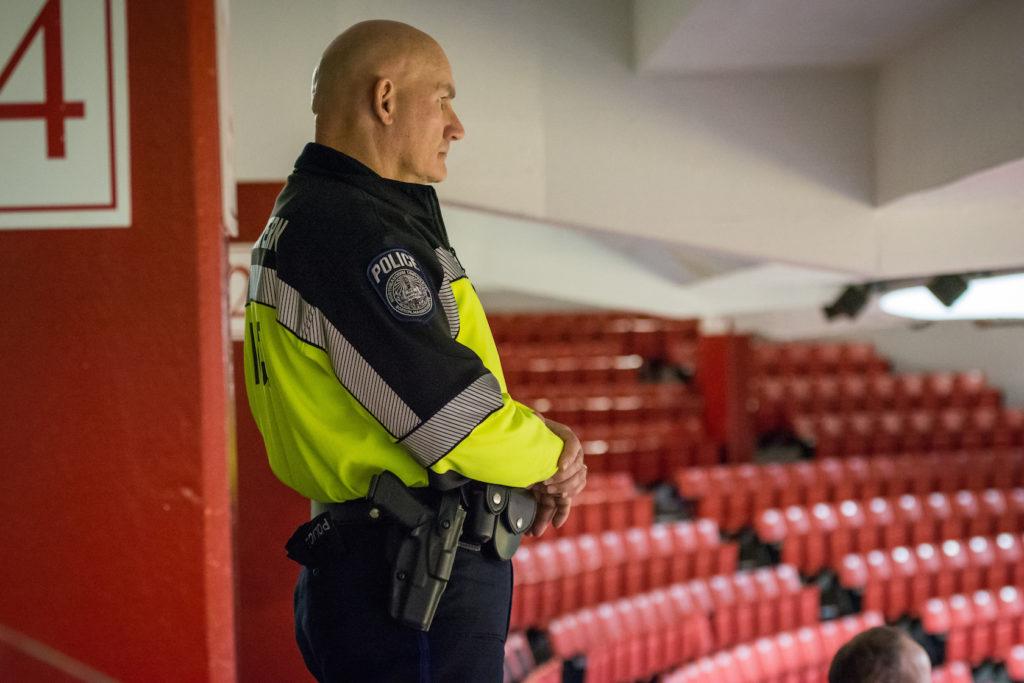By Alejandro Serrano, news correspondent
The Northeastern University Police Department (NUPD) will be launching an initiative in January to help identify individuals exhibiting questionable or unusual behavior and to prevent extreme violence, such as on-campus shootings, according to Deputy Chief Ruben Galindo.
Seven NUPD officers have gone through training that emphasizes violence prevention through community engagement.The initiative, which was formed in partnership with University Health and Counseling Services (UHCS) and We Care, Northeastern’s crisis assistance center, will be phased in starting in January.
The specific role of the seven officers in executing the initiative will be to train the Northeastern community. Galindo said that the officers will train staff, students and faculty on issues of identifying “questionable behavior” – such as identifying someone who may feel isolated – and the measures that should be taken afterwards. These measures include informing those identified resources available from University Health and Counseling Services (UHCS).
UHCS did not respond to a request for comment and Galindo couldn’t elaborate on what sort of resources would be available or what they would do if students refused help.
“We need to start caring more for each other so that these individuals who feel isolated, or not part of a group, can take on a different sense of value for themselves,” Galindo said.
Twenty NUPD officers received anti-racial profiling advanced security training in identifying behavior that could indicate a tendency toward violence or antisocial behavior.
“I think it is always good for police to be more informed because a lot of people go to [NUPD] for a lot of issues, such as mental health crisis, regardless of the police’s expertise,” Megan Wiechnik, National Alliance on Mental Illness (NAMI) helpline coordinator, said. “It is something to be concerned about when it comes to targeting [people with mental health issues]…but creating resources and reducing stigma sounds like a good move.”
Galindo described two parts of the initiative.
“One has to do with identifying a need from within our community and your environmental awareness,” he said. “[The other] has to do with things that are an imminent threat on campus that look unusual to you. We want people to be vigilant but to go on about their day without being scared every time they walk in the city.”
Training about security awareness will be available to the Northeastern community in February.
Various levels of instruction will be available and will range from a 15-minute video to a full-day, eight-hour course. The curriculum and contents of these trainings are to be discussed at the seven officers’ first meeting, which was postponed from its original date on Nov. 27.
“I will go to the training [once it commences],” Miriam Frank, vice president of Active Minds, NU’s mental health advocacy awareness group and a junior psychology major, said. “I think it is good, learning how to look out for other people and finding a way to intervene in a helpful way.”
Galindo said that NUPD engages as much as possible with the community on a daily basis to develop a feel for what is normal, therebyenabling an officer to identify unusual behavior.
“Keeping the campus and community safe requires the expertise of obvious and not-so-obvious behaviors that may require interference,” Renata Nyul, spokesperson for the university, said. “The interference may mean helpful assistance be it finding a building or in some cases preventing something larger from happening.”
Once suspicion is aroused from an individual due to unusual behavior, the goal of the initiative isn’t for Northeastern community members to contact NUPD, but rather to know of resources available to get help for said individual – making police intervention one of the last resorts, said Galindo.
“I doubt it [the initiative] is going to be fully effective, but any training is better than no training,” Cambridge Health Alliance psychiatrist J. Wesley Boyd said. “I think that there are some individuals who are very savvy and aware and might not learn much from such training, but there is also a large group of students and faculty that can benefit a lot.”
Photo by Brian Bae









